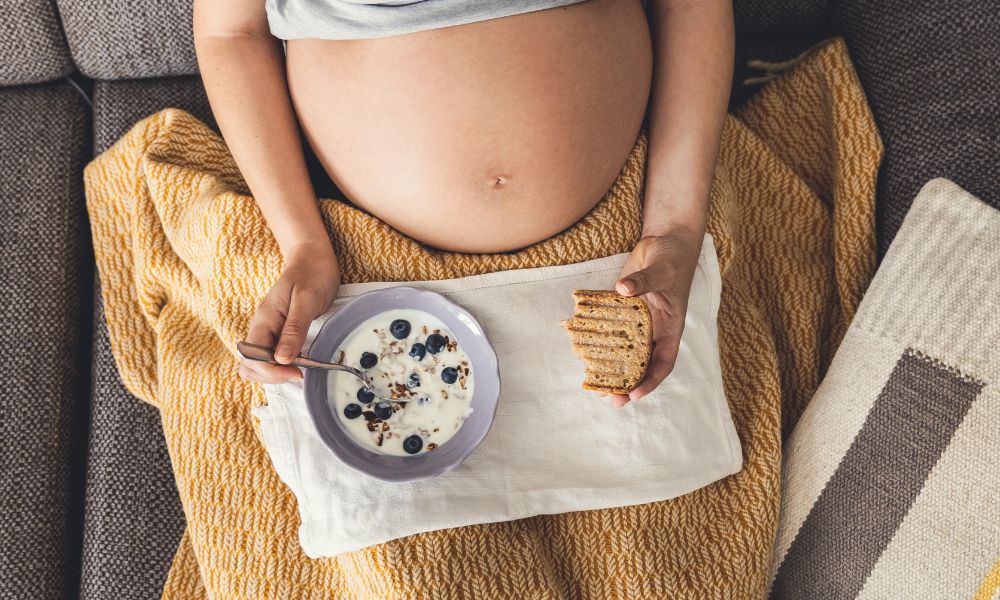So, not all goat cheese is safe for women during pregnancy.
But most is—you just need to know what to look out for.
Soft and hard is the best rule of thumb, although there are a couple of other things to keep in mind. Ripened surfaces and mold-ripened cheeses, for example, are considered unsafe.
Let’s look further into this.

Can you eat goat cheese while pregnant?
It depends. Some cheeses are perfectly safe, but others pose a considerable risk.
The basic rule of thumb is that hard cheeses are safe, and pose no more risk than any other kind of food.
Hard cheese is made from pasteurized goat’s milk, and this along with the moisture content make it almost impossible for bacteria to thrive.
This is the other important factor: pasteurization. If the milk is pasteurized, it’s most likely safe.
Pasteurization is the process of heating milk (or indeed other food products) to sterilize it for mass consumption.
This makes it much safer for pregnant women.
Whether it’s milk from goats, cows, sheep—isn’t as important.
What’s important is that it’s passed the necessary sterilization processes. As long as it isn’t a soft cheese and it is pasteurized, it should be fine.
So, what are some cheeses not to eat while pregnant?
| Related Articles |
|---|
What cheeses to avoid while pregnant?
So, the biggest danger is going to come from soft cheeses, soft goat cheese included.
Soft cheese is, by its nature, made from unpasteurized milk. It’s therefore inherently dangerous because it hasn’t been sterilized in the same way other cheeses and dairy products are.
This bacteria can cause food poisoning, which can be very dangerous for an unborn baby.
White rind cheese, known otherwise as chevre, is a common variety of goat cheese.
This is a soft cheese similar in consistency to camembert.
Again, when we talk about soft and hard cheese, all you need to do is touch it to know the difference.
Any cheese that has been made with a ripened surface, or a mold ripened surface, is not going to be safe for a pregnant woman.
Again, this cheese is essentially made my allowing bacteria to run its course and cause a form of mold.
While we can eat this no problem as adults, it poses a significant risk for babies.
So, any soft cheese, any mold ripened cheese, and any unpasteurized cheese are absolute no gos.
Is all goat cheese pasteurized, then?
Is all goat cheese pasteurized?
No, it isn’t.
As I said, soft cheese pretty much universally is made with unpasteurized milk.
It’s difficult to make soft cheese with pasteurized milk—so you generally won’t see such cheese.
Other than that, though, most goat cheese is pasteurized.
Where ever possible, pasteurization is more or less a universal practice of dairy production.
It’s been used in the industry since it was invented in the 19th Century, and it keeps our food just that little bit safer.
When you’re pregnant, you need to be extra careful of what you eat.
While it is not exactly a death sentence to eat unpasteurized dairy products ordinarily, again, the bacteria at play can have a much greater effect on unborn babies.
So, the two main things you need to be sure of when buying cheese while pregnant are that it is pasteurized and that it is not a soft or mold-ripened cheese.
As long as it fits this criterion, you should be fine.
But what if you were to eat unpasteurized cheese while pregnant?
What happens if you eat unpasteurized cheese while pregnant?
The first thing to do is not to panic.
Unless you ate a very large amount, the likelihood is that everything will be fine.
Not eating unpasteurized cheese is a precaution as much as anything else.
That’s not to say the danger is not real.
If you feel any ill effects after eating unpasteurized goat cheese, then try to see a medical professional as soon as you can,
If only so they can put your mind at ease.
As I say, the likelihood is everything will be fine.
In the worst case, though, a resulting illness could lead to serious complications, so just be sure you are safe and healthy.
So, the bottom line is you’ve got to be careful.
Cheese does pose a bit of a risk while pregnant, and it can be a bit confusing to keep up with what’s safe and what isn’t.
If you’re in any doubt whatsoever, always consult a doctor.
Cheese is great, but it’s not worth putting your pregnancy at risk for.
It’s no joke—the danger is very real.
Do your research about different cheeses.
